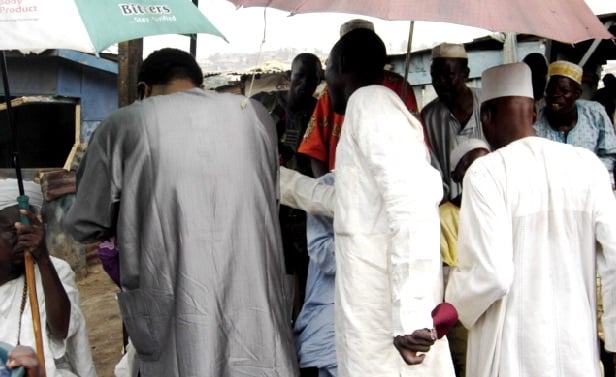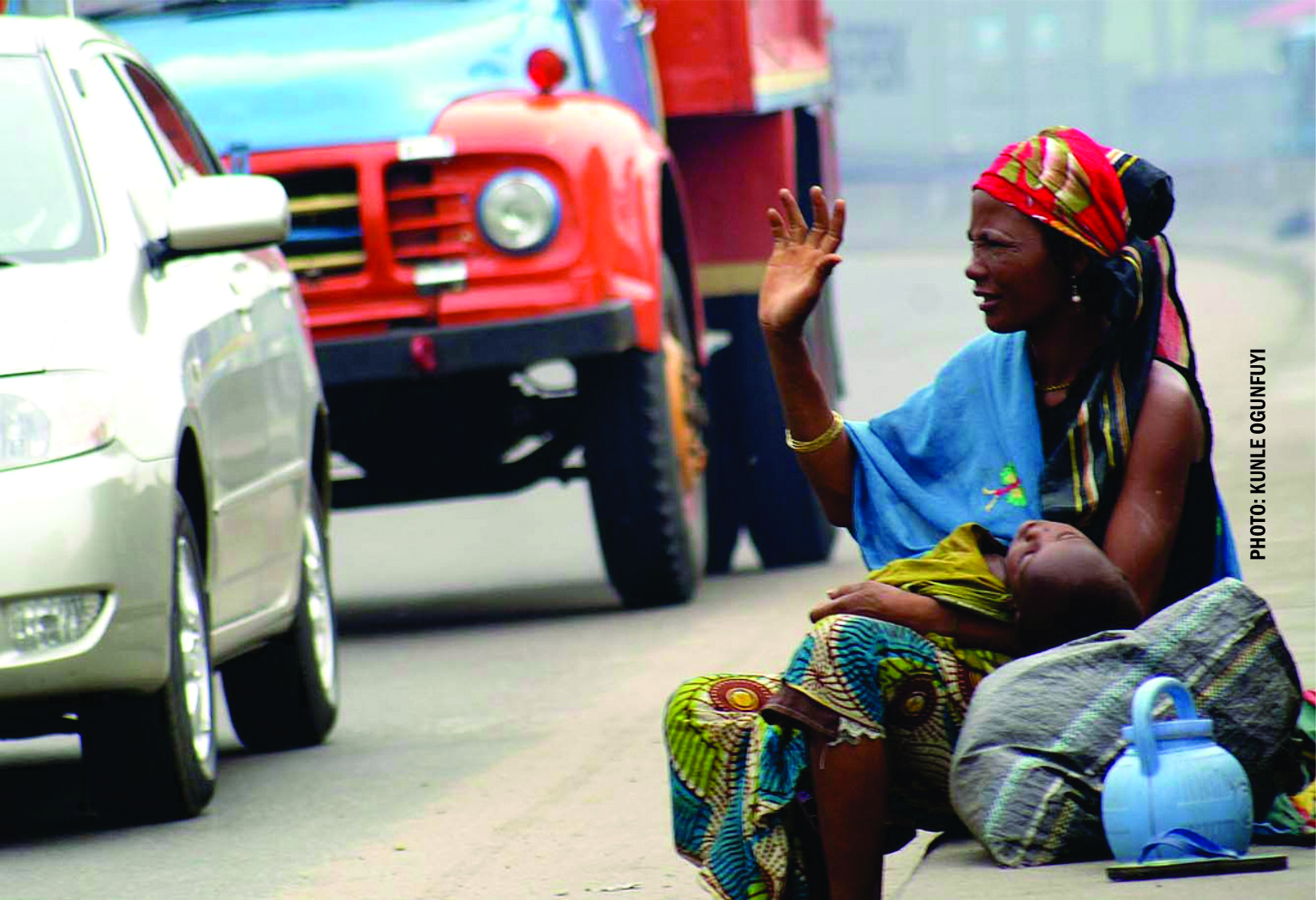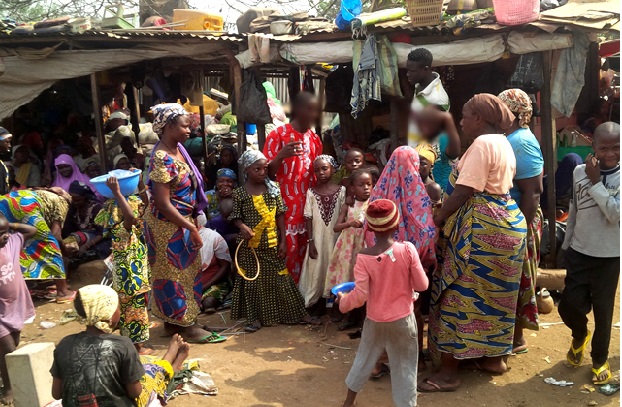BY OMAR ATIRI
HELP!
In less than 20 minutes, three different donors have come and gone. First was a very tall lady in a black dress well made up. She parked a Nissan Altima 2010 edition across the street before coming to the pavilion; she distributes crisp N50 notes to the women section of the pavilion without saying a word as she leaves without looking back. Not long after that, a well-dressed man parked a BMW close to the Men’s pavilion and distributes N200 notes.
In the space of sixty minutes, five cheerful givers had been to the pavilion at Sabo, distributing gifts ranging from puff-puff to used cloths and money. Usually, when a donor comes, the beggars, especially the women, would raise their voices, each displaying her disability in order to curry more favour from the donor. Apart from showing their disabilities, the lead woman would at times stand up and show the donor around to be sure of the segment of people he wants to help.

The organisation among the destitute is amazing. Asked what type of help they would like, since money is not a lasting solution to every problem they may be facing, the first thing that comes on the list is “abinci” meaning food, then money, then good clothes. When prodded about the welfare of the children, some of the women had expressed interest in having a teacher come to the pavilion to teach their children.
Advertisement
Nana, mentioned above, had said that they desire their children to go to school but the fees are killing. “I have two children, one in primary three that one pays N11,000 as school fees, and the other in nursery two paying N10,000.”
She claims that most of the other children attend the Ibadan Municipal Government primary school, not far from them, but said that in spite of the fact that their children were not being well-taught, the teachers were always demanding for money, and that is the major reason she decided to send her children to a private school.
When told that the teachers and headmistress of the school said that they were always withdrawing their children halfway through the school term to do amariya (new bride), Nana said that although it is true, it was no excuse for the teachers to be constantly demanding money. She claims this is the major reason why a lot of the children have stopped attending school.
Advertisement
WHERE DO THEY GO?
For many of the destitute, nightfall is nightmare. Like Maryam mentioned earlier, many of them have to wait for shop owners to close for the day before settling down for the night. They also have to leave very early in the morning before the day’s business starts.
In Lagos, bridges and flower hedges still do the job of sheltering this group of people, but as I learnt during the investigation, most women are not exposed to the harsh elements; they still get a place to go even if it’s someone’s front door.
For the beggars in Abeokuta, there is another Sabo, and that is also where the beggars go at night. Here, unlike Ibadan, the destitute say they pay N2, 000 every month for a sleeping space.
Advertisement
Back at the beggars’ pavilion in Sabo, Ibadan, the Oba, as the lead beggar is referred to, said the people would appreciate any form of help that comes. He mentioned that late Ibadan strong man and proponent of ‘Amala Politics’, Lamidi Adedibu, had built a house in which most of the disabled beggars live. He was going to let us see the house, which he claimed was located within Sabo, when a doctor and former councillor arrived.
RACKET OR GENUINE INTEREST
Asked how he helps the beggars at Sabo, he claimed that he offers them treatment anytime they fell ill, although he failed to mention whether the treatment was free. It is apparent, from the way the Oba talked to him, that he was well-respected by the beggars.
During our discussion with him about the health of the children, their education and other issues, we told him about our findings of the high rate of school dropouts among the destitute, we expressed worry about the girls: what happens to them after they drop out of school? The doctor, speaking off record, said instead of the girls to remain in poverty like their parents, when they see suitors and they are of marriageable age, they give them off in marriage.
He carefully mentioned that the girls were married off at 18 years of age, but we noted that there were girls between the ages of nine and twelve, skulking around the pavilions in heavy make-up. We also noted that the older women would not allow us talk to them; they had a well-dressed young child whom they dragged out and insisted we talked to. From what she was saying, it was obvious that this six-year-old girl had been tutored.
Advertisement
The doctor blamed the prevalence of destitution on unemployment, pointing out that there were some of the disabled people there at the pavilions who had certificates but resorted to begging because the government had no job for them.
FAILED PROMISES
Corroborating the words of Nana earlier, he said failed promises were one of the reasons why he was summoned and why he said we should stop recording and taking pictures.
Advertisement
Nana had earlier said that there was a time they found a newspaper in which they saw their pictures with claims that they had been given a large sum of money; meanwhile, they did not receive anything. She bitterly lamented that several people had approached them for interviews and to take pictures without their consent – consent here we translated as payment.
Nana’s words and the way the doctor listened carefully to everything the people already told us suggested that there was a measure of control on what they were allowed to tell inquirers.
Advertisement
POLITICAL VALUE
One of the indicators of destitution is the lack of a chance to be heard or to make a political choice, a form of disenfranchisement from the nation’s political decision making like voting and being voted for.
But while still talking with the doctor, we asked if the beggars would not be disenfranchised from the forth coming elections. To our surprise and with a little smile dancing on his lips, the doctor assured us that all the beggars had their Permanent Voter Cards (PVC) and were ready to exercise their political rights. This dimension suggests that the destitute, despite their challenges, had political value to politicians.
Advertisement
“I arranged for a senator to come and see them yesterday but he could not make it,” he said. “But I am sure he would come.”
It also suggests that there may be people who may not want a proper rehabilitation for the destitute in order to use them to their advantage politically because of their vulnerability.
‘SPIRITUAL’ BEGGARS
Giving her name first as Iya Ibeji, Anu Gandonou is from Badagry. She is dressed in a clean blue buba and wrapper. She leans on the fence of UBA bank in the popular Balogun market, Lagos, holding two babies in her arms. She says the babies are both eight months old; they are twins and they are the reason she is here begging for alms.
“It is not as if I can’t feed them,” Gandonou said. “But they have been falling sick constantly and a prophet said I must beg for alms for them in the market before the sickness flees completely.”
The money received from the eight-day begging exercise will be used to buy materials for offering to appease the spirits of the children and then the sickness will flee forever, she says. Some of the materials include coconut, beans and candles. The rest of the money would be contributed to the furtherance of the place of worship.
The babies’ father does not have a problem with the begging exercise, Anu says. Other mothers of twins have also done the ritual, so it is no big deal.
* To be continued
* Additional reporting by Ayodele Olofintuade
* This report was accomplished with the support of the Wole Soyinka Centre for Investigative Journalism (WSCIJ) and the Embassy of The Netherlands
Add a comment





